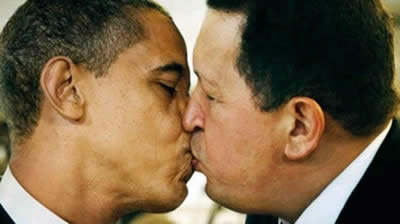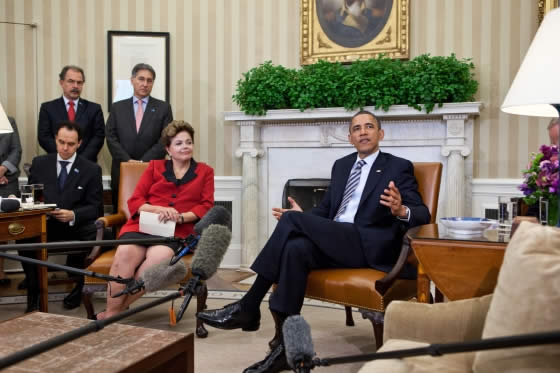Argentina’s President Cristina Fernandez de Kirchner warmly congratulated President Barack Obama yesterday after he won reelection as U.S. President.
Elsewhere in South America, leaders’ reactions were mixed.
Venezuela
Venezuelan leader Hugo Chávez surprised many in September when he said, “I hope this doesn’t hurt his campaign, but if I was from the United States I would vote for Obama.”
Chávez has been uncharacteristically quiet and has not tweeted in several days, but there were some humorous tweets coming out of Venezuela including from a satirical account pretending to be his daughter.
After the Obama win, the Venezuelan tweeted, “Even though Chavez denies it, he is happy about the victory of the empire,” referring to the USA.
Chávez’s youngest daughter, Rosinés has been the brunt of jokes since early this year when she tweeted a picture of herself holding dollars, which are difficult to obtain by ordinary Venezuelans.
Another account,ChavezOfficial, retweeted a photoshopped photo of Chávez and Obama kissing.
If nothing else, the satire proves Venezuela is not as oppressive as the international press tends to report.
Bolivia
Evo Morales, who seems to have taken over the role as South America’s most outspoken anti-U.S. leader, had some strong words in reaction to the Obama win. (Spanish)
“Thanks to the Latino vote, Obama won again. The best thing that he can do to recognize this fact is lift the embargo on Cuba.” He went on to criticize the U.S. for giving protection to criminals exiled in the U.S.
He specifically named former Bolivian president, Gonzolo Sánchez de Lozada. Bolivia sent a former request to Washington for the extradition of Sánchez de Lozada in 2008 for human rights violations.
Lozada continues to reside comfortably in the U.S.
Morales also criticized the U.S’s electoral college and the money spent on political campaigns.
“Unfortunately it isn’t the people of the United States who decide who is the President,” he said. “It’s the banking system and the arms industry who put the money (for the campaign). It’s them who decide.” He said that with the billions of dollars spent on the election campaign, “they could have resolved all of the social problems in Haiti.”
Bolivian Vice Minister of Decolonization (that’s Bolivia’s job title for Secretary of State), Félix Cárdenas struck a similar tone.
“Now we shouldn’t expect anything from the United States,” he said. He went on to criticize the U.S. for its decadent level of consumption as well as military intervention in Iraq, Afghanistan and Libya. The United States he said, “is always trying to dominate us economically and exert political control that no longer exists.”
Paraguay
Paraguayan Secretary of State José Félix Fernández Estigarribias couldn’t have made comments more antithetical to those of Bolivia’s leaders.
After closely following TV coverage he said the electoral process in the U.S. is ‘impeccable’ but avoided opining specifically on the reelection in a radio interview. “We don’t meddle in the internal affairs of other countries,” he said.
Earlier he did say, “We have excellent relations with the U.S.A. We hope that President Obama contributes to further improving relations with Latin America and solving the problems related to Latin American immigration.”
Paraguay has become a pariah in the region after the impeachment of former President Fernando Lugo in June of 2012. Other Latin American countries painted the ousting as a coup d’état, although Lugo himself referred to it as a ‘congressional coup.” While Paraguay has been thrown out of the Mercosur Union by member nations, current president Federico Franco has received the support of Barack Obama.
Chile
Chile is not a part of the Mercosur Union but is one of the region’s most important trade partners with the U.S.

After Obama’s win, Chilean President, Sebastián Piñera tweeted, “I congratulate President Obama on his reelection. We hope to keep working together to strengthen the ties between Chile and the U.S.A.”
Piñera and Obama both studied at Harvard and have other commonalities, such as mutual appreciation for each other’s wives, as reported after their 2011 visit.
While both countries are interested in amplifying their trade agreements, they don’t see eye to eye on the use of nuclear energy and weapons of mass destruction (the Chilean leader opposes both). The U.S., and by extension, Obama, is viewed with suspicion by some Chileans because of U.S. involvement in the 1973 coup d’etat leading to the brutal dictatorship of Augusto Pinochet.
Brazil
In a public address on November 7, Brazilian President, Dilma Rousseff said, “I seize this opportunity to congratulate the people of the United States and President Barack Obama.”
Relations between the United States and Brazil have been strained this year by a Brazilian corruption scandal, Brazil’s concern over U.S. intervention in the region, and a lack of a free-trade agreement between the two countries.
Uruguay
Uruguayan President José ‘Pepe’ Mujica, one of the most popular leaders among South Americans, has so far not commented publicly on Obama’s reelection. As the leader of a sleepy nation of 3.3 million citizens he appears more focused on Uruguay’s position in the Mercosur Union than with international affairs.
 By all appearances Mujica doesn’t have a twitter account, although a twitter user who has co-opted his name wrote in all caps, ‘Bien, Negro.’
By all appearances Mujica doesn’t have a twitter account, although a twitter user who has co-opted his name wrote in all caps, ‘Bien, Negro.’
José Mujica has said publicly that he would like to be invited for an official visit to Washington, although his wife, Senator Lucía Topolansky hasn’t helped his cause much.
Earlier this year she gave a talk in Buenos Aires about the Mercosur Union where she dismissed any involvement of ‘Yankees’ in Uruguayan business.


